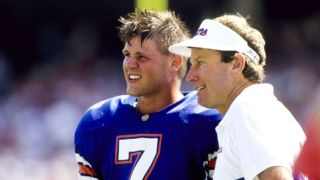|
Steve Spurrier's most enduring legacy will be that he changed college football, in particular the SEC, with his Fun 'n' Gun offense and the way he pitched the ball around the ballpark. But boy, did he make it fun, too. Spurrier, frustrated by the mounting losses and feeling as if he simply didn't have enough left in the tank to go on as South Carolina's coach, abruptly stepped down Monday night -- bringing to a close a Hall of Fame coaching career that was as entertaining as it was successful. Despite the way it ended, Spurrier's career numbers are truly staggering: a 228-89-2 record in 25 seasons with a national title and six SEC crowns. He is the all-time wins leader at both Florida and South Carolina. (Bear Bryant is the only other coach to lead two SEC schools in wins.) And Spurrier's 131 SEC victories trail only Bryant's 159. But Spurrier's career was about so much more than numbers. "Nobody jabbed at you the way Coach Spurrier would, and let me tell you, he jabbed at everybody," said Texas coach Charlie Strong, who worked under Spurrier on the Florida staff in the 1990s. "Most of the time, all you could do was laugh because he just said what a lot of other people thought. There won't ever be another one like him because coaches nowadays are too concerned about how it sounds. With him, he just said it." Spurrier was the king of the passing game, shaking up the three-plays-and-cloud-of-dust SEC when he returned to his alma mater as head coach in 1990, but he was also the king of the one-liner. There are too many gems to possibly name them all. But a sampling: "You know what FSU stands for, don't you? Free Shoes University." "You can't spell Citrus without U-T" "I always liked playing [Georgia] that second game [of the season] because you could always count on them having two or three key players suspended." "I know why Peyton came back for his senior year. He wanted to be a three-time star of the Citrus Bowl."  "He's probably the most competitive guy I've ever known, but he's also one of the most genuine guys I've ever known," said Oklahoma coach Bob Stoops, who was Spurrier's defensive coordinator at Florida and remains one of Spurrier's closest friends. "He's special. He really is, and one of those guys you come across in life that makes you better just having had a chance to know him." Nearly 20 years later, Stoops still laughs when he thinks about Spurrier looking at him out in the surf while riding waves near Spurrier's Crescent Beach, Florida, beach house one early September day and chirping, "Bobby, you think those Tennessee boys are body-surfing right now?" It was the Gators' off week, but Manning and Tennessee awaited that next week in what was a perennial top-10 matchup in those days. That was the essence of the Head Ball Coach. He was fiendishly competitive, but always the life of the party. He'd engage fans of rival schools out in public, jump up on stage and sing with country music star Kenny Chesney and drink beer shirtless with the best of them. He loved going against the grain and loved the gamesmanship even more. After all, what other coach purposely leaves a bogus offensive tips sheet lying around and hoping another team might find it? That's what Spurrier did in the bathroom of a movie theater in Maryville, Tennessee, near the hotel where the Gators were staying the Friday night before their game with the Vols back in the early 1990s. A few years earlier, the whole "faxgate" scandal had erupted when former Tennessee assistant Jack Sells was caught by a Kinko's employee near Tennessee's campus faxing diagrams and notes from the Vols' playbook to then-Florida defensive coordinator Ron Zook. The hilarious thing about Spurrier leaving that dummy tips sheet is that one of Florida's security officials brought it to him as they were leaving and told him that one of the players must have dropped it. "No, take it back. We left it there on purpose," Spurrier howled. Spurrier's memory is as sharp today as it was 20 years ago. He doesn't forget anything -- plays from two decades ago, records (both his and those of the coaches he competed against) and any time somebody dared to take him to task in print or on television.  His whole "enemies" rant prior to the start of this season was precipitated by one too many journalists wondering whether the 70-year-old Spurrier had lost his fastball. The abrupt nature of Spurrier's departure won't sit well with some, especially given that he doesn't plan on finishing out this season. But he's as impulsive as he is quick-witted and was on the verge of walking away at the end of last season. He thought better of it and returned, but has long maintained that he would never hang around just to hang around. "I can promise you that when it's time for me to go, I'll be the first to say it's time for me step aside and let somebody else come in here and have a shot at it," Spurrier said last December. Now, some nine months later, that time has come. Alabama coach Nick Saban said it was a sad day for college football. "I hate it for Steve and hate it for college football," Saban said. "The guy's been one of the best coaches for a long, long time and a great personality for the game. I have a tremendous amount of respect for what he's accomplished and what he's done. He's always one of the hardest guys you have to play against and a great competitor and a real friend. He always will be. "It's always sad to see somebody who's meant so much to the game walk away." Even Saban wasn't immune to some of Spurrier's biting commentaries over the years. A few years ago, Spurrier mused that if Saban wanted to be known as the greatest coach of all time that he would have to win a national championship somewhere other than Alabama. Spurrier's rationale was that Alabama had a history of winning championships and annually raked in the best players. Saban didn't necessarily agree with everything Spurrier said, but he respected the fact that Spurrier had the guts to say what was on his mind. "A lot of times, it probably needed to be said," Saban said. The fact that Spurrier chose South Carolina as his landing point back in college football in 2005 tells you all you need to know about him. After parting ways with the Washington Redskins and sitting out the 2004 season, Spurrier was advised to be patient. Saban was on his way to the NFL to take the Miami Dolphins' head job, meaning LSU would soon be open. But Spurrier didn't want to go to LSU. He wanted to go to a school that had never won big before, and South Carolina had exactly one season of double-digit victories before he arrived in 2005. In the three seasons prior to his arrival, the Gamecocks had gone 0-12 against their four biggest rivals: Clemson, Florida, Georgia and Tennessee. Similarly, he didn't have any interest in Alabama in 2007 when that job came open and then Alabama athletic director Mal Moore called to gauge his interest. "I told Mal to hang in there with Saban," Spurrier told ESPN.com last year. "I knew he wasn't happy in the NFL, and they obviously got the right guy. I didn't want to go to a place where they'd already won a bunch of national championships." Through it all, Spurrier has remained true to himself and been a model for many of the younger coaches who've followed in his steps. The past couple of years, Spurrier has played golf at the SEC spring meetings with Auburn's Gus Malzahn and Ole Miss' Hugh Freeze. "Coach Spurrier has impacted and influenced more of us in the business than he will ever know," Freeze said. "He will be missed and will always be the HBC."  One of the things Spurrier did best, other than call plays, was juggle a rather large ego with the ability not to take himself too seriously. Pro golfer and good friend Chris DiMarco loves telling the story about taking his son to Spurrier's office and pointing out Spurrier's Heisman Trophy sitting over in the corner. Spurrier waved his hands and quickly picked up another trophy he'd received for making a hole-in-one in a golf tournament. "Don't look at [the Heisman Trophy]. This is the one you need to look at," said a beaming Spurrier, holding his hole-in-one trophy. Of course, Spurrier's golf clubs were never too far away from his desk, and the only thing that made him madder than raking in a 3-foot putt if you were playing with him was not counting all of your strokes. He knew everybody else's scores better than they did. It almost seems surreal that the Head Ball Coach has seemingly coached his last game. Obviously, this is not the way he wanted to go out. It's not the way an icon should go out. But let us all rejoice that we had him for as long as we did. It's been one hell of a ride. There might be better coaches to come along, and there might be more successful coaches to come along. There will never be another coach who makes the college game come alive the way Spurrier did. And for that, we're all grateful. Most of us, anyway.
|

